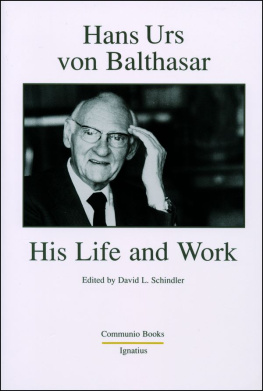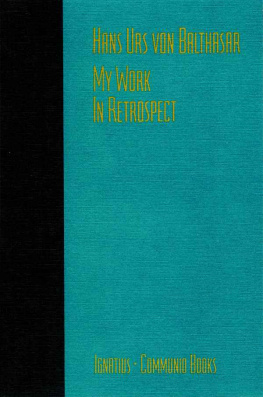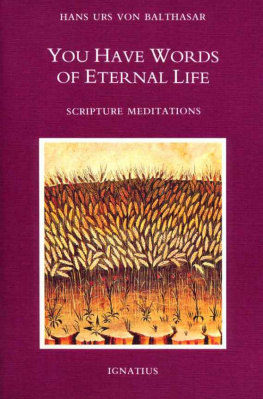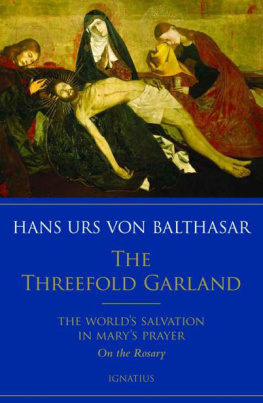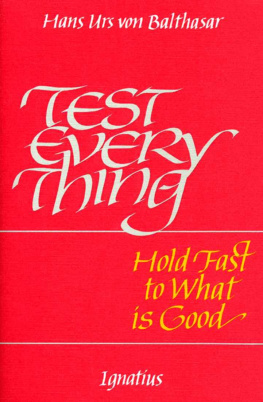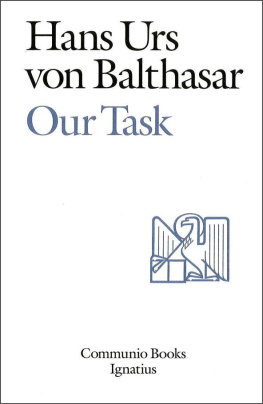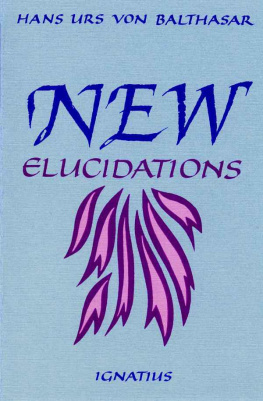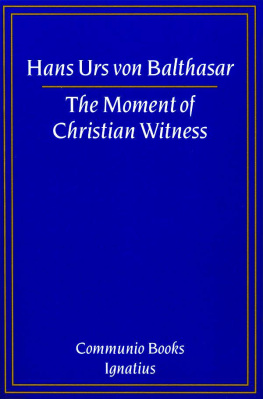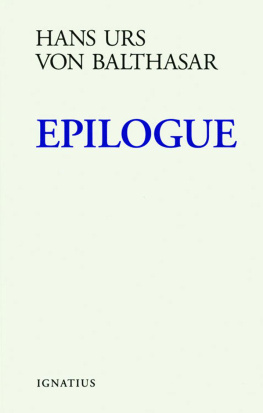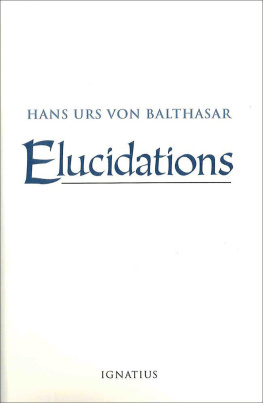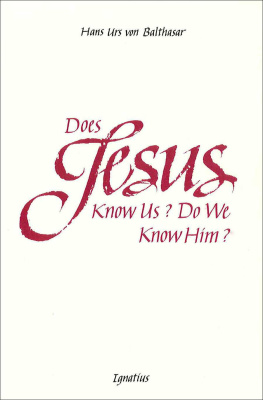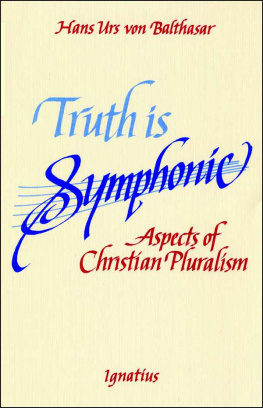David L. Schindler (editor) - Hans Urs Von Balthasar: His Life and Work
Here you can read online David L. Schindler (editor) - Hans Urs Von Balthasar: His Life and Work full text of the book (entire story) in english for free. Download pdf and epub, get meaning, cover and reviews about this ebook. year: 1991, publisher: Ignatius Press, genre: Religion. Description of the work, (preface) as well as reviews are available. Best literature library LitArk.com created for fans of good reading and offers a wide selection of genres:
Romance novel
Science fiction
Adventure
Detective
Science
History
Home and family
Prose
Art
Politics
Computer
Non-fiction
Religion
Business
Children
Humor
Choose a favorite category and find really read worthwhile books. Enjoy immersion in the world of imagination, feel the emotions of the characters or learn something new for yourself, make an fascinating discovery.
- Book:Hans Urs Von Balthasar: His Life and Work
- Author:
- Publisher:Ignatius Press
- Genre:
- Year:1991
- Rating:3 / 5
- Favourites:Add to favourites
- Your mark:
- 60
- 1
- 2
- 3
- 4
- 5
Hans Urs Von Balthasar: His Life and Work: summary, description and annotation
We offer to read an annotation, description, summary or preface (depends on what the author of the book "Hans Urs Von Balthasar: His Life and Work" wrote himself). If you haven't found the necessary information about the book — write in the comments, we will try to find it.
Hans Urs Von Balthasar: His Life and Work — read online for free the complete book (whole text) full work
Below is the text of the book, divided by pages. System saving the place of the last page read, allows you to conveniently read the book "Hans Urs Von Balthasar: His Life and Work" online for free, without having to search again every time where you left off. Put a bookmark, and you can go to the page where you finished reading at any time.
Font size:
Interval:
Bookmark:
HANS URS VON BALTHASAR:
HIS LIFE AND WORK
His Life And Work
Edited by
David L. Schindler
COMMUNIO BOOKS
IGNATIUS PRESS SAN FRANCISCO
Cover photo by Andr Muelhaupt
1991 Ignatius Press, San Francisco
All rights reserved
ISBN 0-89870-378-6
Library of Congress catalogue number 91-73330
Printed in the United States of America
The Spirit meets the burning questions of the age with an utterance that is the keyword, the answer to the riddle. Never in the form of an abstract statement (that being something that it is mans business to draw up); almost always in the form of a new, concrete supernatural mission: the creation of a new saint whose life is a presentation to his own age of the message that heaven is sending to it, a man who is, here and now, the right and relevant interpretation of the Gospel, who is given to this particular age as its way of approach to the perennial truth of Christ. How else can life be expounded except by living? The saints are Tradition at its most living, Tradition as the word is meant whenever Scripture speaks of the unfolding of the riches of Christ, and the application to history of the norm which is Christ. Their missions are so exactly the answer from above to the questions from below that their immediate effect is often one of unintelligibility; they are signs to be contradicted in the name of every kind of right-thinkinguntil the proof of their power is brought forth. St. Bernard and St. Francis, St. Ignatius and St. Theresa were all of them proofs of that order: they were like volcanoes pouring forth molten fire from the inmost depths of revelation; they were irrefutable proof, all horizontal tradition notwithstanding, of the vertical presence of the living Kyrios here, now, and today.
Hans Urs von Balthasar, A Theology of History (New York: Sheed and Ward, 1963), 105.
Hans Urs von Balthasar
A Resume of My Thought
Peter Henrici, S.J .
Hans Urs von Balthasar: A Sketch of His Life
Alois M. Haas
Hans Urs von Balthasars Apocalypse of the German Soul:
At the Intersection of German Literature, Philosophy, and Theology
Charles Kannengiesser
Listening to the Fathers
Johann Roten, SM .
The Two Halves of the Moon:
Marian Anthropological Dimensions in the Common Mission of Adrienne von Speyr and Hans Urs von Balthasar
Maximilian Greiner
The Community of St. John:
A Conversation with Cornelia Capol and Martha Gisi
Werner Lser, SJ .
The Ignatian Exercises in the Work of Hans Urs von Balthasar
Antonio Sicari, O.C.D .
Hans Urs von Balthasar: Theology and Holiness
Georges Chantraine, S.J .
Exegesis and Contemplation in the Work of Hans Urs von Balthasar
Peter Henrici, S.J .
The Philosophy of Hans Urs von Balthasar
Wolfgang Treitler
True Foundations of Authentic Theology
Louis Dupr
The Glory of the Lord:
Hans Urs von Balthasars Theological Aesthetic
John ODonnell, S.J .
Hans Urs von Balthasar: The Form of His Theology
Ellero Babini
Jesus Christ:
Form and Norm of Man according to Hans Urs von Balthasar
Marc Ouellet, S.S .
The Foundations of Christian Ethics according to Hans Urs von Balthasar
Christoph Schonborn, O.P .
Hans Urs von Balthasars Contribution to Ecumenism
Bishop Karl Lehmann and Bishop Waiter Kasper
Preface to Hans Urs von Balthasar: Gestalt und Werk
Henri Cardinal de Lubac, SJ .
A Witness of Christ in the Church: Hans Urs von Balthasar
Joseph Cardinal Ratzinger
Homily at the Funeral Liturgy of Hans Urs von Balthasar
ELLERO BABINI teaches theological anthropology at the Studio Teologico Accademico of Bologna and is a member of the editorial board of the Italian edition of Communio .
GEORGES CHANTRAINE, S.J. is a professor at the Jesuit Faculty of Theology in Brussels and a member of the editorial board of the French edition of Communio .
HENRI CARDINAL DE LUBAC, S.J., one of the leading Catholic theologians of the twentieth century, now lives in retirement in Paris.
LOUIS DUPR holds the T. Lawrason Riggs Chair in the philosophy of religion at Yale University.
MAXIMILIAN GREINER is Managing Editor of the German edition of Communio .
ALOIS M. HAAS is Professor of Early German Literature at the University of Zurich.
PETER HENRICI, S.J. is Professor of Modern Philosophy at the Pontifical Gregorian University, Rome and Director of the German edition of Communio .
POPE JOHN PAUL II.
CHARLES KANNENGIESSER holds the Katherine Huisking Chair in theology at the University of Notre Dame.
WALTER KASPER is Bishop of Rottenburg-Stuttgart, Germany and a member of the editorial board of the German Communio .
KARL LEHMANN is Bishop of Mainz, Germany, President of the German Bishops Conference, and a member of the editorial board of the German Communio .
WERNER LSER, S.J. is Director of the Philosophisch-Theologischen Hochschule St. Georgen in Frankfurt, where he is Professor of Dogmatic Theology.
JOHN ODONNELL, S.J. is Professor of Dogmatic Theology at the Pontifical Gregorian University, Rome.
MARC OUELLET, S.S. is Rector of the Grand Sminaire of Montral and a member of the editorial board of the North American edition of Communio ,
JOSEPH CARDINAL RATZINGER, a co-founder of the German edition of Communio , is Prefect of the Sacred Congregation for the Doctrine of the Faith.
JOHANN ROTEN, S.M. is Director of the International Marian Research Institute at the University of Dayton, Ohio.
DAVID L. SCHINDLER teaches metaphysics and fundamental theology in the Program of Liberal Studies at the University of Notre Dame, and is the Editor-in-Chief of the North American edition of Communio .
CHISTOPH SCHNBORN, O.P. is Professor of Dogmatic Theology at the University of Fribourg, Switzerland, a member of the International Theological Commission, and a member of the editorial board of the German edition of Communio .
ANTONIO SICARI, O.C.D. teaches dogmatic theology at the Studio Teologico Carmelitano in Brescia, Italy and is a member of the editorial board of the Italian edition of Communio .
WOLFGANG TREITLER is Research Assistant at the Institute for Fundamental Theology and Apologetics at the University of Vienna.
The Christian, says von Balthasar, remains the guardian of the metaphysical wonder which is the point of origin for philosophy and indeed for authentic human existence. This wonder lies unacknowledged but alive in the childs first opening of its eyes to its mothers smile. Through that smile the child learns that it is contained, affirmed and loved in a relationship which is incomprehensively encompassing, already actual, sheltering and nourishing. The relationship, in other words, is a priori (616), and it calls forth a wonder at being permitted to be. Thus we come to the heart of von Balthasar: This condition of being permitted cannot be surpassed by any additional insight into the laws and necessities of the world (633).
Being permitted: here is indicated the disposition that provides the unifying center of the great themes of von Balthasars life and work: obedience, love, beauty, gloryand indeed suffering and passion and selflessness unto death. All of these are aspects of and responses to gift. Not gift in any vague or generic sense, but gift first as spoken by the trinitarian God in Jesus Christ and received into creation through Mary and the Church by means of the Holy Spirit.
Von Balthasars theology, then, as a theology of wonder and gift, finds its form in the Christic-Marian-ecclesial fiat . The phrase he coined for the basic way or method of theologynamely, kniende theologie : praying or kneeling theologyapplies to his own work. A theology whose first method is prayer does not exclude other (e.g., historical-critical) methods; but it nonetheless includes these only as it transforms them. It is the saints, says von Balthasarthose who have received the word of God into every fiber of their beingwho alone, finally, have warrant to speak about God.
Next pageFont size:
Interval:
Bookmark:
Similar books «Hans Urs Von Balthasar: His Life and Work»
Look at similar books to Hans Urs Von Balthasar: His Life and Work. We have selected literature similar in name and meaning in the hope of providing readers with more options to find new, interesting, not yet read works.
Discussion, reviews of the book Hans Urs Von Balthasar: His Life and Work and just readers' own opinions. Leave your comments, write what you think about the work, its meaning or the main characters. Specify what exactly you liked and what you didn't like, and why you think so.

